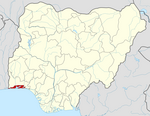Related Research Articles

Ijebu-Ode is a town in Ogun State, South Western geopolitical zone in Nigeria, close to the A121 highway. The city is located 110 km by road north-east of Lagos; it is within 100 km (62 mi) of the Atlantic Ocean in the eastern part of Ogun State and possesses a warm tropical climate.

Iseyin is a town located in Oyo, Nigeria. It is approximately 100 km (62 mi) north of Ibadan. The city was estimated to have a population of 236,000, according to United Nations 2005 estimate, which increased to 362,990 in 2011, and has a total land mass of 1,419 km2 (548 sq mi). Iseyin is centrally located and accessible via road networks from Ibadan, Oyo, Abeokuta, and Ogbomoso. There are expanses of land which can be used for industrial, agricultural and institutional purposes in and around the city. The title of the monarch of Iseyin is "The Aseyin of Iseyin". There are a lot of educational institutions in Iseyin out of which are Ladoke Akintola University of Technology Iseyin campus, Polytechnic like SAF Polytechnic, Secondary Institutions like Kelani College Iseyin, Greater Love Model etc. which has since recorded a large amount of distinction in the WASSCE & SSCE results.
Yusuf Olatunji, also known as Baba Legba or Baba L’Egbaa, was a Nigerian Sakara drum player, who popularized the sakara music style. He was purportedly born in 1905 or 1906 in a village called Gbegbinlawo in Ogun State in south-western Nigeria, although there are still doubts about the location of his birth. His mid-life conversion to Islam boosted his career in Yoruba music. He was born a Christian and he hailed from Iseyin in Oyo State. He was formerly known as Joseph Olatunji. He started his career in 1937 with his first record and he joined Abibu oluwa band in 1927.
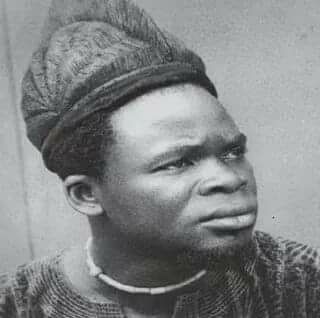
Durodola Durosomo Duroorike Timothy Adisa Ladipo, more commonly known as Duro Ladipo, was one of the best known and critically acclaimed Yoruba dramatists who emerged from postcolonial Africa. Writing solely in the Yoruba language, he captivated the symbolic spirit of Yoruba mythologies in his plays, which were later adapted to other media such as photography, television and cinema. His most famous play, Ọba kò so, a dramatization of the traditional Yoruba story of how Ṣango became the Orisha of Thunder, received international acclaim at the first Commonwealth Arts Festival in 1965 and on a Europe an tour, where a Berlin critic, Ulli Beier, compared Ladipọ to Karajan. Ladipo usually acted in his own plays.
Ode-Omu is a town in the present Osun State, Nigeria, established in 1900 sequel to implementation of relocation treaty signed between the Ibadan (Oyo) and Ife in 1886. This place is situated in Ayedaade, Osun, Nigeria, its geographical coordinates are 7° 32' 0" North, 4° 24' 0" East and its original name is Ode-Omu. The settlement was established following civil unrest in neighbouring Yoruba cities of Ife and Modakeke in south-western Nigeria. Most of the families in Ode-Omu have links to Modakeke.

Somolu is a local government area (LGA) in Lagos. It is located in Southwest Nigeria, North of Lagos city and its administrative headquarters is located on Durosimi Street. Somolu Local Government is part of the Lagos East Senatorial Zone and a lawmaker represents the district at the Federal House of Representatives. Somolu is plagued by problems of poor sanity, high rent, overall poverty and youth criminal subculture. It is also known for its printing industry, which is the largest in Lagos and one of the most diverse in the world. Most notably, offset and digital print shops can be found on the Bajulaiye Road.

Oshodi-Isolo is a Local Government Area (LGA) within Lagos State. It was formed by the second republic Governor of Lagos State, Alhaji Lateef Kayode Jakande, also known as 'Baba Kekere' and the first Executive Chairman of the Local Government was late Sir Isaac Ademolu Banjoko. The LGA is part of the Ikeja Division of Lagos State, Nigeria. At the 2006 Census it had a population of 621,509 people, and an area of 45 square kilometers. On the 1st of August 2021, Honourable Kehinde Oloyede Al-Maroof was elected for a first term into office as the Executive Chairman.
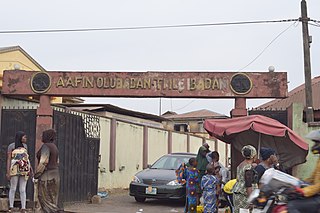
Olubadan is the royal title of the king of Ibadanland in Nigeria. Ibadan was founded in the 16th century, but the present Yoruba people only took control around 1820. By 1850 they had established their unusual succession principle, which is quite different compared with other traditional Yoruba rulers in that it alternates between two lines. It usually takes decades to groom an Olubadan for the stool through stages of chieftaincy promotion, thus meaning that just about any male born title-holder of the metropolitan centre is a potential king.
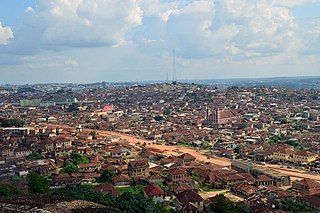
Abeokuta is the capital city of Ogun State in southwest Nigeria. It is situated on the east bank of the Ogun River, near a group of rocky outcrops in a wooded savanna; 77 kilometres (48 mi) north of Lagos by railway, or 130 kilometres (81 mi) by water. As of 2006, Abeokuta and the surrounding area had a population of 449,088.

The Eyo Festival, otherwise known as the Adamu Orisha Play, is a Yoruba festival unique to Lagos, Nigeria. In modern times, it is presented by the people of Lagos as a tourist event and due to its history, is traditionally performed on Lagos Island.
Ejigbo is a prominent city in Yoruba Land and the headquarters of Ejigbo Local Government Area, one of the oldest local government areas of Osun State in Nigeria. Ejigbo is strategically placed in the middle of the region, as 35 kilometres (22 mi) north-east of Iwo, 30 km (19 mi) from Ogbomoso in the north and 24 km (15 mi) from Ede in the south-east. It is about 40 km (25 mi) north-west of Osogbo, the capital of Osun State, and about 95 km (59 mi) north-east of Ibadan. It is part of the Ede North/Ede South/Egbedore/Ejigbo federal constituency. The population is 138,357 according to the GeoNames geographical database. The average elevation is 426 metres (1,398 ft).
The Territories of the Awori are a part of Nigeria inhabited by the Awori tribe sub-ethnic group of the Yoruba people, speaking a distinct dialect of the Yoruba language. Traditionally, Awori are found in two Nigerian States: Ogun and Lagos. The Awori people migrated from Ile Ife and occupied the present day Lagos state. Post-colonial creation of States and local governments influenced the splitting of the homogenous people into the present Ogun and Lagos States in South-western Nigeria. Awori towns in Ogun State are Otta, Igbesa, Ilobi and Tigbo.
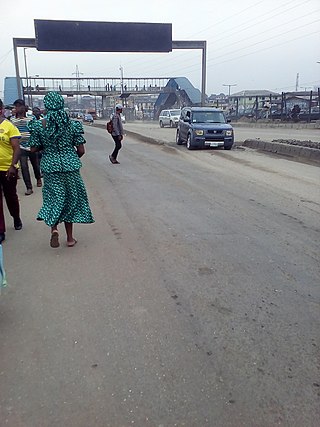
Ketu is a city in Lagos, Nigeria. It is close to Mile 12. The place has a branch of Foursquare Gospel Church.
Ìyál'ọ́jà is a Yoruba word that literally translates to "Mother of the Market". However, it has more commonly been used to refer to a prominent traditional chieftaincy title among the Yoruba people.
The Iyalode is a high-ranking female chieftain in most of the Yoruba traditional states. The title is currently within the gift of the obas, although Njoku asserted in 2002 that the process of choosing an Iyalode in pre-colonial Nigeria was less of a choice by the monarch, and more of the accomplishment and involvement of the woman to be so honoured in economic and political matters.
Agbowa-Ikosi is an ancient town in the Nigerian state of Lagos. On it lies the second biggest asphalt concrete road in Nigeria.
The Kiriji War, also known as the Ekiti–Parapo War, was a 16-year-long civil war between the subethnic kingdoms of the Yoruba people, specifically divided between the Western Yoruba, which was mainly the Ibadan and Oyo-speaking Yorubas, and the Eastern Yoruba, who were the Ekiti people, Ijesha, Ijebu people, and others.
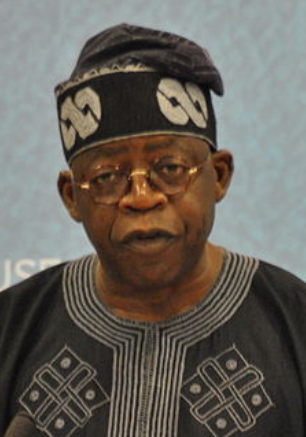
The 2023 Nigerian presidential election in Lagos State will be held on 25 February 2023 as part of the nationwide 2023 Nigerian presidential election to elect the president and vice president of Nigeria. Other federal elections, including elections to the House of Representatives and the Senate, will also be held on the same date while state elections will be held two weeks afterward on 11 March.
References
- ↑ "The Yoruba Today". Archived from the original on 2007-10-24. Retrieved 2010-03-23.
- ↑ "Ikosi-Isheri Development Council". Archived from the original on 2007-04-17. Retrieved 2010-03-23.
- ↑ Largest fruit market
- ↑ "Church of Nigeria : Diocese of Lagos West". Archived from the original on 2010-12-04. Retrieved 2010-03-23.
- ↑ "Impeachment saga rocks Lagos council - Vanguard News". Archived from the original on 2014-09-02.
update

